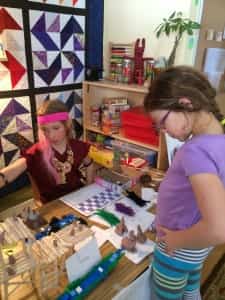 “If all of us are gathering food, then that leaves nobody to build a shelter.” This was the astute observation of one of Mack-Boulder’s second grade students during a reflection check-in amidst the “civilization” role-playing. This role-playing was the introductory activity of Melody Parker’s second grade class’s Ancient Civilizations Unit of Inquiry.
“If all of us are gathering food, then that leaves nobody to build a shelter.” This was the astute observation of one of Mack-Boulder’s second grade students during a reflection check-in amidst the “civilization” role-playing. This role-playing was the introductory activity of Melody Parker’s second grade class’s Ancient Civilizations Unit of Inquiry.
The role-playing activity helped the students establish the big ideas that civilizations are based on human connections, that humans all have the same basic needs, and that joining together enables humans to be more successful. Once those were in place, the students then shifted focus to the civilization of Ancient Egypt.
“Giving kids choice enables them to go deeper in their inquiries because they are pursuing something they care about and to which they have an emotional connection. With an emotional connection, learning is stronger,” says Melody.
Thus, she had her students choose a specific aspect of Ancient Egypt that most interested them. She not only let them choose a topic to study in depth, she let them decide how they wanted to present their findings to an audience of fellow Mack students, teachers, and parents. The Ancient Egypt Museum was the result.
The topics the children chose varied from religion, war, food, mummification, religion, governance, daily life, and so on. Melody was there to provide guidance and support, but she let her students express their learning through whatever means fit best for them. The resulting exhibits varied: recreated Egyptian games, a display of Egyptian animals, sculptures, and a live action short play featuring a priest completing the mummification process (complete with paper organs as props), to name a few.
The students worked together to accomplish an amazing display of learning. They each contributed their own skills and knowledge for the good of the whole. The creation of the museum was itself an exercise in people making connections and joining together to achieve success.


